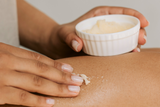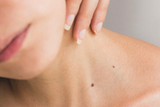Easy Peasy You
Facial oils for combination and “impure” skin: which one is suitable?
Posted by Lara Schimweg on
Look closely: Not every oil that is advertised for combination and impure skin is actually suitable.
Do you ever wonder why so many people rave about facial oils ? But if you have oily or combination skin, you already naturally have enough oil on your skin. And now you're supposed to put a greasy oil on it? Facial oils can actually cause pimples to appear on oily or combination skin. However, if you choose the facial oil that suits your skin type, you can actually make your skin less oily. The right facial oil reduces inflammation and helps prevent new pimples.
In this article you will find out when a facial oil makes sense for your skin. You will find out what importance linoleic acid has for your skin, which plant oils are suitable and which you should avoid. At the end you will also get tips on how to sensibly integrate a facial oil into your routine.
Will facial oils give me impure skin?
It's true that if you randomly put any facial oil on your skin if you have oily or combination skin, you would probably get more breakouts. Because too much unnecessary fat can cause pimples.Do facial oils clog pores?
Vegetable oils can clog your pores if they contain the wrong fatty acids for your skin. A very high proportion of oleic acid is not suitable for your skin type. Some oils are therefore considered comedogenic. And that's why you should avoid too much oleic acid in your facial oil.What does comedogenic mean?
When facial oils are described as comedogenic, it means that you could get pimples and breakouts from this oil. However, whether an oil is comedogenic is very individual. Lists from the Internet should therefore be viewed with caution.If you choose the right vegetable oil with the right fat spectrum for your skin, you can actually benefit from the balancing effect of facial oils.
When does a facial oil even make sense for impure skin?
If your skin does not have inflammation or severe impurities, a moisturizer is sufficient. In this case, your skin does not need facial oil.However, if your skin often itches, feels tense or often has pimples and deposits, this is a sign that your skin is lacking moisture. In order to keep the moisture in the skin, the skin becomes greasy uncontrollably. An oil-free moisturizer would not be enough because the skin cannot retain moisture.
So that you get fewer pimples and the underlays, redness and inflammation disappear, you can now support your skin a little. Either with a very light cream or with a facial oil that suits your oily or combination skin. However, conventional vegetable oils are not suitable for acne. Then skin-identical oils such as squalane or neutral oil are better because they resemble the skin even more and do not contain any substances that can feed acne bacteria.
Choose the right facial oil for combination skin
Attention: Some oils are used as... "Clearifying Oil" Applied. Sounds pretty good at first, right? However, such marketing slogans often mean nothing at all. You should be suspicious, especially if a product is advertised as having an intensive effect - it will magically remove pimples overnight.Tip: No compatible skin care product will transform your skin overnight. A facial oil is not a magic solution.
Oils with linoleic acid are particularly suitable for combination skin
Vegetable oils consist of different fatty acids. If you have impure skin, make sure that your facial oil has as much moisture as possible high proportion Linoleic acid contains. Linoleic acid is a natural component of the skin . And impure and combination skin usually has too little linoleic acid in the skin.Oleic acid should be as little as possible in your facial oil because it could clog your skin's pores.
A vegetable oil containing linoleic acid and anti-inflammatory alpha and gamma linolenic acid will soothe your skin and help reduce inflammation and breakouts.
Which facial oils for impure skin?
Which oil contains a lot of linoleic acid?
Hemp oil
In Hemp oil you will find different linoleic acids . Gamma-linolenic acid, for example, acts against inflammation and thus prevents pimples and redness.In contrast to other vegetable oils, hemp oil contains particularly little oleic acid. In addition, hemp oil is rich in phytosterols, which keep the skin's lipid layer intact and strengthen the skin barrier. This means your skin loses less moisture and becomes less greasy.
If you want to preserve the valuable vitamins and nutrients, always make sure that your hemp oil is cold-pressed and organic. Hemp oil is very sensitive to light. It should always be packed light-tight. Best in dark glass. This is the only way your skin gets some of the naturally contained vitamins and nutrients.
Hemp oil is very light and is quickly absorbed into the skin. That's why it's particularly suitable for combination skin.
By the way, hemp oil is also very good for your health when added to your diet.
Note for rosacea: If you have rosacea , your skin may also benefit from the anti-inflammatory effects of hemp oil. Because it soothes the skin and has an anti-redness effect.
If you have not had any experience with vegetable oils, be particularly careful at the beginning. Because every rosacea is individual. Some do well with plant oils rich in linoleic acid, while others do not. In any case, listen to your skin and pay close attention to what it tells you. More skin care tips for rosacea .
Rosehip oil
Rosehip oil (also rosehip oil or wild rose oil) contains a little more linoleic acid as hemp oil. However, it does not contain gamma linolenic acid.A notice: Make sure your rosehip oil was extracted from the seeds. Rosehip oil, which was obtained from the fruit pulp, contains essential oils that can irritate the skin.
Organic CO2 pressed rosehip seed oil is of very high quality. There are significantly more nutrients and vitamins here than in cold-pressed oil. Rosehip seed oil should always be packaged in a dark place so that your skin gets some of the vitamins.
Note for rosacea: Many also use rosehip oil for rsoacea. However, you should know that rosehip oil is a stimulating oil and can stimulate blood circulation. Decide for yourself whether wild rose oil works for your rosacea.
Vegetable oils that are only partially suitable for impure skin
The following plant oils are often advertised for "impure" skin, but are only suitable to a limited extent.Jojoba oil
Jojoba oil is actually a plant wax. It is particularly similar to the fat on our skin and is therefore particularly well tolerated. Like hemp oil it contains particularly little oleic acid .The natural vitamin E works against free radicals and skin stress. This strengthens the skin so that less inflammation can occur in the skin. Jojoba oil locks moisture in the skin. Your skin no longer loses as much moisture and no longer becomes as greasy.
Unfortunately, jojoba oil does not contain any balancing linoleic acids. Therefore, it is only recommended to a limited extent for impure and oily skin.
Tip: If your skin has a few dry patches, you can use jojoba oil selectively. However, if you have combination skin and especially oily skin, you should not apply jojoba oil all over your face. Instead, you can use an oil rich in linoleic acid to balance your skin.
Facial oils that are not suitable for combination and impure skin
There are several other vegetable oils that are high in linoleic acid. Unfortunately, the oleic acid content of many oils is almost as high. These oils are not suitable for your skin type.Argan oil
Argan oil has a very balanced ratio between linoleic acid and oleic acid .Oily, impure skin and combination skin should not use the oil due to the high oleic acid content. It could potentially cause pimples. Argan oil is well suited for dry skin.
Tea tree oil
Tea tree oil is a Volatile oil . It is very irritating to the skin. Undiluted, tea tree oil can even cause serious skin burns.Caution: Essential oils are not a good idea . Even though they can dry out pimples, they attack your skin over time, making it easy for acne bacteria to multiply. In addition, essential oils break down when they come into contact with sunlight. This creates free radicals on your skin and this can cause inflammation.
Unfortunately, tea tree oil is still often recommended for oilier and impure skin. It is said that tea tree oil works well against impurities and pimples. It is often recommended to apply tea tree oil selectively to the inflamed pimple. This is fatal: because what actively works against the pimple is the alcohol contained in tea tree oil. And that's not good for the skin at all.
The alcohol removes moisture from the skin. The skin becomes unbalanced and becomes greasy again in an uncontrolled manner in order to retain the remaining moisture. If your skin is constantly greasy, new pimples and inflammations will constantly appear. Tea tree oil does not belong on any skin. It is very irritating and it does more harm than good.
And what about oil blends?
Many facial oil mixtures are not particularly well thought out and contain far too much oleic acid. That's why they are often not suitable for combination and impure skin.
Tip: Oil for people who cannot tolerate oil
We have developed an oil blend that consists entirely of pure processed oils, making it suitable for people who cannot otherwise tolerate facial oils. Human Glow contains pure linoleic acid, squalane and caprylic/capric triglycerides and is therefore very suitable for oily or combination skin - even for pimples and impurities.
Human GlowUse facial oils correctly
Never simply replace your cream with a vegetable oil. Because a good cream provides your skin with moisture, which an oil cannot.Even though many facial oils are advertised as particularly moisturizing. That's not entirely true: oils simply ensure that moisture cannot escape from the skin. Vegetable oil is therefore only indirectly moisturizing.
Facial oils in the routine
Tip: you can use facial oil at night.First, apply a moisturizer to your skin. This can be a soothing gel, serum, toner or light cream. Skin-friendly moisturizers are hyaluronic acid, sodium PCA or glycerin.
Danger: Rose water or witch hazel water are not suitable moisturizers. They contain drying alcohols and irritating essential oils. Unfortunately, we often recommend hammam hazel water (witch hazel) and rose water for sensitive or impure skin.
Always apply the oil to damp skin. Otherwise you would wash out fats. Lock in moisture with a few drops of vegetable oil.
To start, see how many drops of facial oil your skin really requires. The great thing about pure oils is that you can adjust the amount depending on the season so that your skin is always ideally cared for.
If you don't have any experience with facial oils, it's best to start with one or two drops. Always pay attention to how much oil is good for your skin. Because even if facial oils rich in linacid are ideal for your skin type: a facial oil is still a fat. And your skin will tell you how much oil it needs.
Tip: You don't have to apply the same amount of oil to all areas of your face. If you take your skin's feedback seriously, you will quickly find out how much oil your skin needs, so that your combination and impure skin can actually benefit from a facial oil.
Conclusion
Organic hemp oil can be used for combination and impure skin work well because it contains linolenic acids and very little oleic acid. Hemp oil brings the lipid spectrum of your skin back into balance. The gamma-linolenic acid it contains has a mild effect against pimples and inflammation, especially on impure skin, and prevents new impurities. But if you have impurities, hemp oil can also be too much. Then Human Glow might be something for you, as it was developed specifically for people who don't tolerate oils well.The best thing to do under the facial oil is one light cream use with a high water content. Your cream should not contain oils rich in oleic acid, such as avocado, olive, argan or Marula oil included because they could potentially cause pimples. Your cream contains oils rich in linoleic acid, such as hemp oil, or neutral fats, such as Squalane or Caprylic/Capric triglycerides ideal.
Have you had any experience with facial oils? How did your skin tolerate the oil?
- Tags: Hautpflege, Naturkosmetik, Oel, Pickel
← Older Post Newer Post →
0 comments







